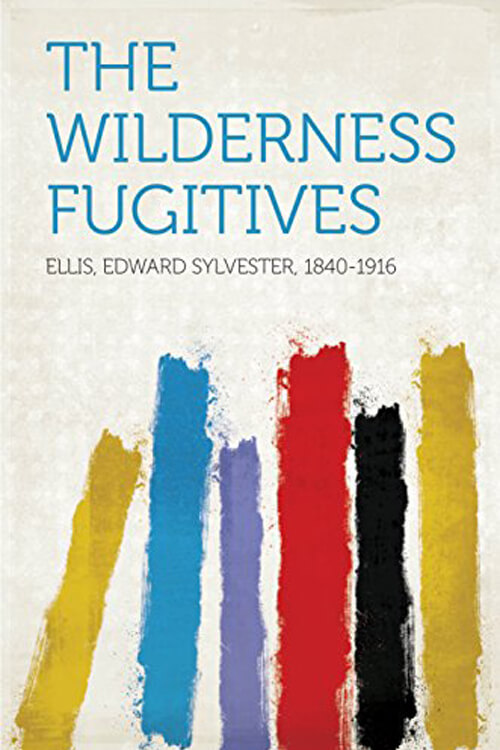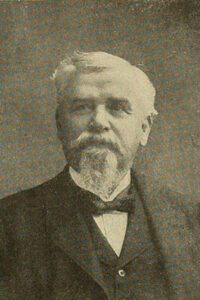
The Wilderness Fugitives
The reader will recall that at the close of The River Fugitives, the narrative left our friends in a situation, apparently, of safety, and the belief, on the part of Jo Minturn, his sister Rosa and Ned Clinton, was firm that in their flight from the dreadful scenes of the Wyoming massacre of July 1778, they had left all dangers behind. They were confident that, under the guidance of the matchless Mohawk, Lena-Wingo (temporarily absent in quest of food), the road to security was beset by no perils worth mentioning.
But, as has also been intimated, they were altogether wrong in this belief. Brother and sister and Ned Clinton were seated near each other on a fallen tree. It was not yet fully dark when the soft tread of a moccasin was heard on the leaves, and they saw the tall, slim figure of the Mohawk come forth like some spirit of the forest to ask them their business in thus invading his domains. The supposition was so general that he had gone in quest of food that a common instinct led them to look to see whether he brought anything of that nature with him. There was enough light left to show that he carried nothing but his gun.
“Well, Jack,” said Ned, “we thought you had gone out foraging, but if you did, you didn’t make much success of it.”
“Lena-Wingo didn’t hunt eat—he hunts something more.”
“Well, did he find it?” asked Rosa, who was more daring in her questions than the others thought it prudent to be.
“Yes—he finds him.”
“Why don’t you bring him here so we may see him?”
“He gone,” was the direct but rather unsatisfactory answer, for there was no indication of what he meant.
Rosa was about to question him further when it struck her that if he wanted them to know what he had been doing, he would tell them only when he chose. And so she forbore.
“I hope the result was pleasing to you,” ventured Ned Clinton on what seemed to be forbidden ground.
“When Lena-Wingo looks for Iroquois in a canoe, he takes knife along.”
As this remark was intended in the light of a joke, all felt the duty of laughing at it, although the mirthful inclination was not tremendous, coming from such a grim source.
“Jo,” added the redskin, after waiting for the applause to wear itself out, “want to see you.”
Read or download Book
Edward S. Ellis
Edward Sylvester Ellis (April 11, 1840 – June 20, 1916) was an American author.
Biography.
Ellis was a teacher, school administrator, journalist, and the author of hundreds of books and magazine articles he produced by his name and several pen names. Notable fiction stories by Ellis include The Steam Man of the Prairies and Seth Jones’s The Captives of the Frontier. Internationally, Edward S. Ellis is probably known best for his Deerfoot novels, which were read widely by young boys until the 1950s.
Dime novels
Seth Jones was a prototypical early dime novel published by Beadle and Adams. It is said that Seth Jones was one of Abraham Lincoln’s favourite stories. During the mid-1880s, after a fiction-writing career of some thirty years, Ellis eventually began composing more severe works of biography, history, and persuasive writing. Of note was “The Life of Colonel David Crockett”, which had the story of Davy Crockett giving a speech usually called “Not Yours To Give”. It was a speech opposing the awarding of money to a Navy widow because Congress had no constitutional mandate to give charity. It was said to have been inspired by Crockett’s meeting with a Horatio Bunce, a much-quoted man in Libertarian circles, but one for whom historical evidence is non-existent.
Pseudonyms
Besides the one hundred fifty-nine books published by his name, Ellis’ work was published under various pseudonyms, including
- Cover of Seth Jones; or The Captives of the Frontier by Edward S. Ellis
- “James Fenimore Cooper Adams” or “Captain Bruin Adams” (68 titles)
- “Boynton M. Belknap” (9 titles)
- “J. G. Bethune” (1 title)
- “Captain Latham C. Carleton” (2 titles)
- “Frank Faulkner” (1 title)
- “Capt. R. M. Hawthorne” (4 titles)
- “Lieut. Ned Hunter” (5 titles)
- “Lieut. R. H. Jayne” (at least two titles in the War Whoop series)[8]
- “Charles E. Lasalle” (16 titles)
- “H. R. Millbank” (3 titles)
- “Billex Muller” (3 titles)
- “Lieut. J. H. Randolph” (8 titles)
- “Emerson Rodman” (10 titles)
- “Colonel H. R. Gordon” (6 titles)
- “E. A. St. Mox” (2 titles)
- “Seelin Robins” (19 titles)






